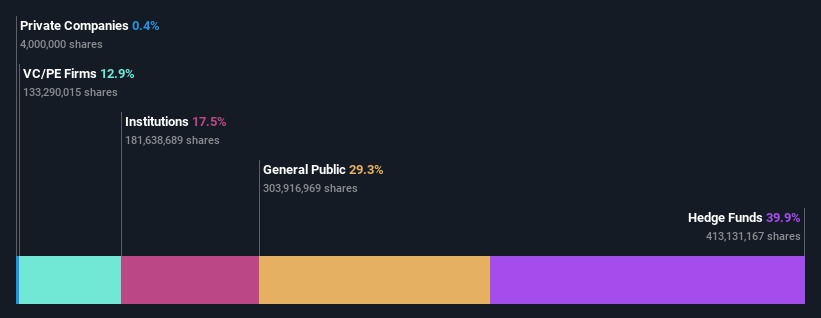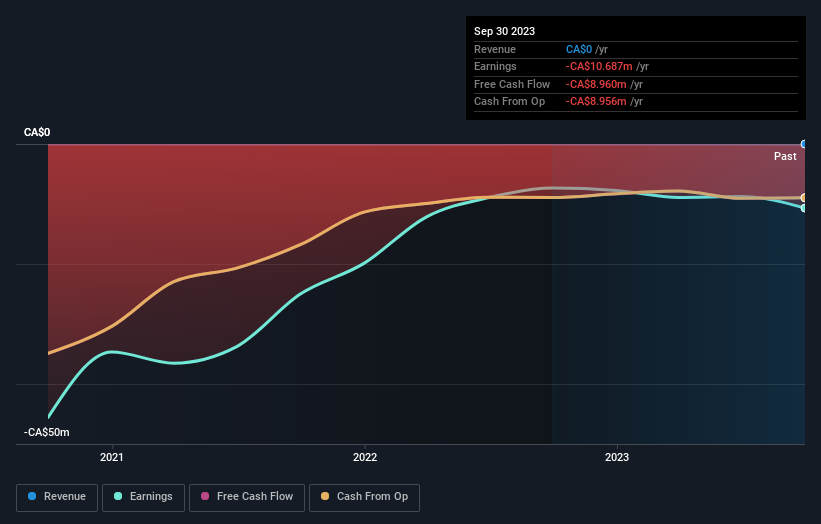- Canada
- /
- Metals and Mining
- /
- TSXV:GBU
Hedge funds investors are Gabriel Resources Ltd.'s (CVE:GBU) biggest bettors and were rewarded after last week's CA$52m market cap gain

Key Insights
- Institutions' substantial holdings in Gabriel Resources implies that they have significant influence over the company's share price
- A total of 4 investors have a majority stake in the company with 59% ownership
- Using data from company's past performance alongside ownership research, one can better assess the future performance of a company
To get a sense of who is truly in control of Gabriel Resources Ltd. (CVE:GBU), it is important to understand the ownership structure of the business. The group holding the most number of shares in the company, around 40% to be precise, is hedge funds. That is, the group stands to benefit the most if the stock rises (or lose the most if there is a downturn).
And last week, hedge funds investors ended up benefitting the most after the company hit CA$528m in market cap. The gains from last week would have further boosted the one-year return to shareholders which currently stand at 149%.
In the chart below, we zoom in on the different ownership groups of Gabriel Resources.
See our latest analysis for Gabriel Resources

What Does The Institutional Ownership Tell Us About Gabriel Resources?
Many institutions measure their performance against an index that approximates the local market. So they usually pay more attention to companies that are included in major indices.
Gabriel Resources already has institutions on the share registry. Indeed, they own a respectable stake in the company. This implies the analysts working for those institutions have looked at the stock and they like it. But just like anyone else, they could be wrong. It is not uncommon to see a big share price drop if two large institutional investors try to sell out of a stock at the same time. So it is worth checking the past earnings trajectory of Gabriel Resources, (below). Of course, keep in mind that there are other factors to consider, too.

It would appear that 40% of Gabriel Resources shares are controlled by hedge funds. That worth noting, since hedge funds are often quite active investors, who may try to influence management. Many want to see value creation (and a higher share price) in the short term or medium term. Kopernik Global Investors, LLC is currently the company's largest shareholder with 17% of shares outstanding. Tenor Capital Management Company, L.P. is the second largest shareholder owning 17% of common stock, and The Electrum Group LLC holds about 13% of the company stock.
Our research also brought to light the fact that roughly 59% of the company is controlled by the top 4 shareholders suggesting that these owners wield significant influence on the business.
While studying institutional ownership for a company can add value to your research, it is also a good practice to research analyst recommendations to get a deeper understand of a stock's expected performance. We're not picking up on any analyst coverage of the stock at the moment, so the company is unlikely to be widely held.
Insider Ownership Of Gabriel Resources
The definition of company insiders can be subjective and does vary between jurisdictions. Our data reflects individual insiders, capturing board members at the very least. The company management answer to the board and the latter should represent the interests of shareholders. Notably, sometimes top-level managers are on the board themselves.
I generally consider insider ownership to be a good thing. However, on some occasions it makes it more difficult for other shareholders to hold the board accountable for decisions.
Our data cannot confirm that board members are holding shares personally. It is unusual not to have at least some personal holdings by board members, so our data might be flawed. A good next step would be to check how much the CEO is paid.
General Public Ownership
The general public-- including retail investors -- own 29% stake in the company, and hence can't easily be ignored. This size of ownership, while considerable, may not be enough to change company policy if the decision is not in sync with other large shareholders.
Private Equity Ownership
With a stake of 13%, private equity firms could influence the Gabriel Resources board. Some investors might be encouraged by this, since private equity are sometimes able to encourage strategies that help the market see the value in the company. Alternatively, those holders might be exiting the investment after taking it public.
Next Steps:
While it is well worth considering the different groups that own a company, there are other factors that are even more important. For example, we've discovered 4 warning signs for Gabriel Resources (3 make us uncomfortable!) that you should be aware of before investing here.
Of course this may not be the best stock to buy. Therefore, you may wish to see our free collection of interesting prospects boasting favorable financials.
NB: Figures in this article are calculated using data from the last twelve months, which refer to the 12-month period ending on the last date of the month the financial statement is dated. This may not be consistent with full year annual report figures.
New: Manage All Your Stock Portfolios in One Place
We've created the ultimate portfolio companion for stock investors, and it's free.
• Connect an unlimited number of Portfolios and see your total in one currency
• Be alerted to new Warning Signs or Risks via email or mobile
• Track the Fair Value of your stocks
Have feedback on this article? Concerned about the content? Get in touch with us directly. Alternatively, email editorial-team (at) simplywallst.com.
This article by Simply Wall St is general in nature. We provide commentary based on historical data and analyst forecasts only using an unbiased methodology and our articles are not intended to be financial advice. It does not constitute a recommendation to buy or sell any stock, and does not take account of your objectives, or your financial situation. We aim to bring you long-term focused analysis driven by fundamental data. Note that our analysis may not factor in the latest price-sensitive company announcements or qualitative material. Simply Wall St has no position in any stocks mentioned.
About TSXV:GBU
Gabriel Resources
Engages in the exploration, evaluation, and development of precious metal mining properties in Romania.
Medium-low with worrying balance sheet.

